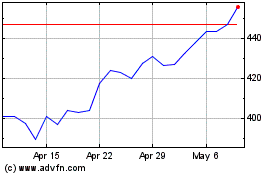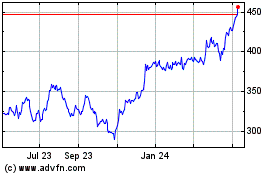By Simon Clark
A Goldman Sachs Group Inc. executive testified that Libya's
sovereign-wealth fund knew what it was doing when it bought
derivatives from the bank that later soured, disputing allegations
that Goldman led an inexperienced buyer into a disastrous
investment.
The Libyan Investment Authority, or LIA, understood the disputed
derivatives it bought from Goldman, Andrea Vella, co-head of Asian
investment banking at Goldman, told the High Court in London on
Thursday.
The transactions were large enough to be described as "elephant
trades," but Goldman didn't do anything wrong in selling them, Mr.
Vella said in court.
The LIA is suing Goldman for $1.2 billion to cover its losses
from nine trades arranged in 2008. Those trades took the form of
equity derivatives and expired worthless in 2011. The LIA alleges
that Goldman executives exerted "undue influence" over its
officials, who didn't understand the trades. Goldman earned about
$222 million from the trades, according to the LIA. Goldman
disputes the amount of profit it made and denies wrongdoing.
"The LIA fully understood the disputed trades and obtained
exactly the exposure which it wanted," Mr. Vella said in his
witness statement. At the time of the Libyan transactions, Mr.
Vella was a London-based leader of Goldman's growth-markets
business. "The underlying shares did not perform as it had
anticipated."
The LIA has said its officials had little understanding of
finance and that the fund managers believed they were buying actual
shares in companies including Citigroup Inc. through the trades.
The cash-based transactions were tied to movements in the share
prices of companies including Citigroup but didn't confer ownership
of the shares.
Mr. Vella said that LIA officials including Mohammed Layas, then
chief of the fund, had experience in finance and understood
markets. Mr. Vella said that Libyan officials including Mr. Layas,
who died last year, understood the difference between purchasing
shares and equity derivatives.
The LIA was interested in buying derivatives instead of shares
partly because it was concerned about the risk of its assets being
frozen by law enforcement authorities in other countries, the
Italian-born banker said. The LIA was created in 2006, after the
country was removed from the U.S. government's list of state
sponsors of terrorism. Its purpose was to invest income from
Libya's oil fields around the world.
"Mr. Layas was wary that any investments made by the LIA could
be affected in the future by any freezing of Libyan assets," Mr.
Vella said in his statement. "He was therefore keen to put in place
appropriate steps to reduce the risk of such an event impacting
investments."
Mr. Vella said a trade to obtain "exposure to Citigroup shares
through a cash-settled forward purchase" met Mr. Layas's objective
of avoiding the risk of asset freezing "because it meant that the
LIA did not own Citigroup shares."
Goldman's relationship with the LIA broke down in a meeting in
Tripoli on July 23, 2008, court documents show. The fund's deputy
chief, Mustafa Zarti, got angry and threatened Goldman bankers
including Youssef Kabbaj, a key member of the team covering the
LIA.
In court, Mr. Vella was asked about a November 2008 letter sent
by law firm Withers to Goldman on behalf of Mr. Kabbaj, who no
longer works at the bank. After the 2008 meeting in Tripoli, Mr.
Kabbaj became concerned that Mr. Vella was making him a "scapegoat"
for the breakdown in the relationship between Goldman and the LIA,
according to the letter.
When Mr. Vella discovered that Mr. Kabbaj had talked to other
Goldman bankers about his concerns, Mr. Vella called him into an
office and "started screaming at him, threatened to fire him before
taking off his shoe and hitting the table with all his strength,"
the letter said. Mr. Vella acknowledged this in front of two
Goldman employees, the letter said.
When asked in court by LIA lawyer Philip Edey whether he hit the
table with his shoe, Mr. Vella repeatedly said he couldn't
remember.
At the end of his questioning, Mr. Edey read out a text message
in which Mr. Kabbaj asked Mr. Vella for permission to call an LIA
official. "Can I call him back without taking the Italian shoe
risk?" Mr. Kabbaj asked.
When asked by Mr. Edey if this was a reference to the
shoe-banging episode, Mr. Vella replied, "I don't know."
"I expect Goldman Sachs to correct the facts and protect my
reputation," Mr. Kabbaj wrote in a June 13 email to The Wall Street
Journal.
The LIA has also said that Goldman tried to influence Mr. Zarti
to agree to the disputed trades by granting an internship to his
younger brother, Haitem Zarti. Mr. Vella said the internship didn't
influence Mr. Zarti's decision to agree to the trades. The banker
said he believed Haitem Zarti would become an LIA employee,
potentially as the head of its London office, and that there was
nothing wrong in awarding him an internship.
A spokesman for Mustafa Zarti said he would not be commenting on
the court case. Haitem Zarti couldn't be reached for comment.
"The internship was an important way to develop Haitem Zarti's
own education in financial instruments," Mr. Vella said in his
statement. The internship would also ensure that Goldman "knew well
a person who would have an important role in the future," he
said.
The LIA has said that Goldman also tried to gain influence by
offering gifts and entertainment to its officials, including
tickets to a soccer match in London during a training visit to the
bank's office.
"It is common for firms to seek to cultivate and generate
goodwill," Mr. Vella said in his statement. "There was nothing
unreasonable about the expenses incurred."
Write to Simon Clark at simon.clark@wsj.com
(END) Dow Jones Newswires
June 30, 2016 17:04 ET (21:04 GMT)
Copyright (c) 2016 Dow Jones & Company, Inc.
Goldman Sachs (NYSE:GS)
Historical Stock Chart
From Apr 2024 to May 2024

Goldman Sachs (NYSE:GS)
Historical Stock Chart
From May 2023 to May 2024
